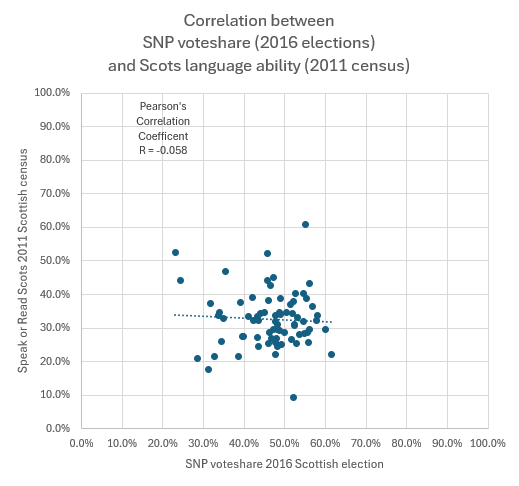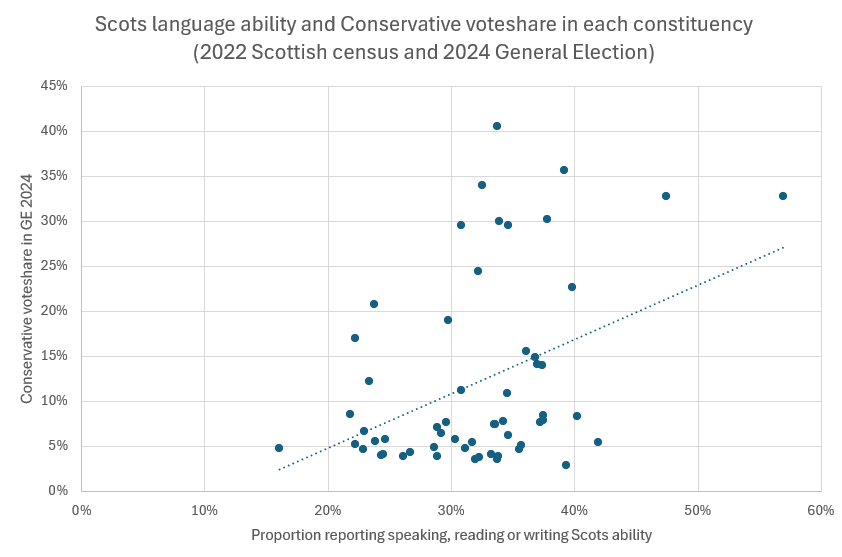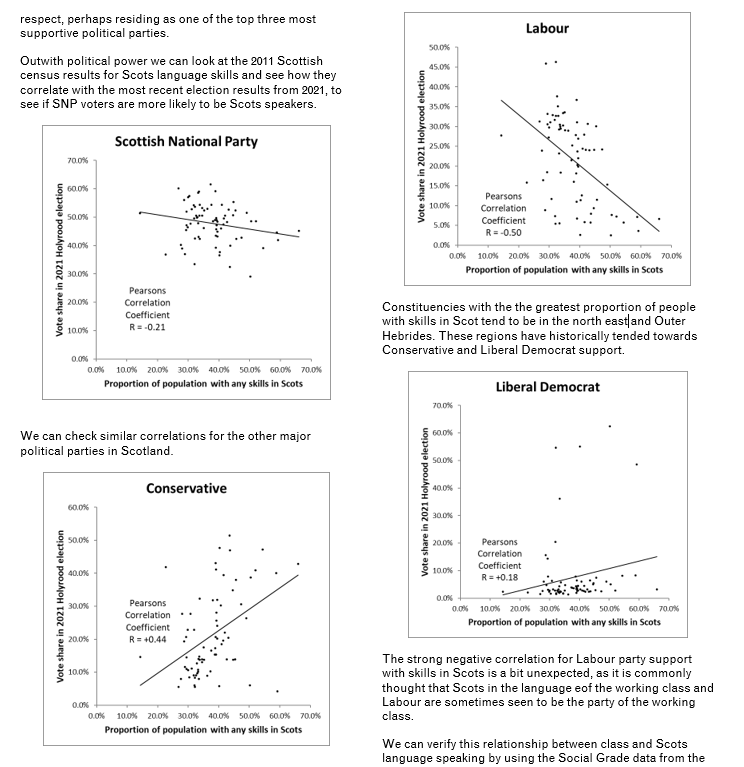Over on the Scots Language Forum on that Facebook there was a brief query about whether there was any research into the link between support for the Scots language and either political nationalism or political unionism.
This is a matter that I’ve looked into and tweeted about countless times, but I’m not sure I’ve ever written up on Substack. So here goes.
Data
The Scottish census data is freely available from the Scottish census website, and the datadrops can be set by Scottish Parliament constituency area.
Then we can faff about with the results to calculate the proportion of Scots speakers or read or writers or understanders in each area.
At this point we can fire up a spreadsheet program, or google sheets.
The Scottish election results are freely available public information, I like to get them from wikipedia, but you could equally get them from individual council websites.
Then we can load up our spreadsheet with the voteshare for each party in whichever election takes our interest.
Graphs
Here’s a scatter graph showing SNP vote share in the 2021 Scottish election and the proportion of people who reported that they considered themselves able to speak or read Scots.
The “Pearson’s Correlation Coefficient” is effectively a measure of how noisy the the correlation is. Whilst on this graph the R = +0.031 because its a big spotty blob that doesn’t really align, we can imagine that if the datapoints all fell on a straight line, the Pearson’s Correlation Coefficient would be R = +1.
This measure of R = +0.031 represents a very weak correlation, or no correlation at all.
Now if we run a similar exercise with the 2016 Scottish election results and the 2011 Scottish census Scots language ability, we get a very slight negative Pearson R = -0.058
Its still just a large blob with no discernible trend.
Finally if we look at the 2011 election results and the 2011 census data we see the Pearson is R = +0.139 a slightly stronger correlation but still nothing we’d like to commit to.
Over the three election / census graphs we can see that there isn’t much of a correlation between Scots language ability and SNP voteshare. The Pearsons aren’t consistently positive or negative, averaging R = +0.037
A brief opinion
Whilst some Scots language proponents are strongly in favour of nationalism and Scottish independence, the elections and censuses represent asking the views of every adult in Scotland, not just a self-selecting sample.
If there was a general correlation between Scots language ability or support and nationalism, we can’t see it in this data. If we only knew this data, without experience of Scotland we might be forgiven for thinking that any belief in the correlation is fantasy.
Other parties
I’m so tired, I am a man who hasn’t has a decent night’s sleep in a long time.
Back in December I checked the data for Conservative voteshare in the 2024 UK general election and Scots language ability in the 2022.
Here I didn’t bother calculating the the Pearson’s Correlation Coefficient, but from eyeballing the graph and the Excel trendline, there’s a bit of an obvious correlation. Westminister constituencies with larger Conservative voteshare occasionally have higher proportions of Scots speakers.
Back in 2021 I was thinking about doing a more comprehensive book about Scots languagey stuff, and prepared these graphs, for each of the four main parties (note that the x and y axises have been switched (I’m not a professional research or professional academic, nor am I a writer or a reporter, I’m just an unpaid amateur muddling through as best as I can, if that’s not good enough then feel free to find someone else doing this)
These graphs show the same sort of deal, SNP support has almost no correlation, Conservative has a pretty strong positive correlation. Labour support has a strong negative correlation and Lib Dem support has a little bit of a positive correlation.
In conclusion
I can’t find any data that supports the theory that Scots language ability correlates with nationalism. And what correlation can be seen suggests that it positively correlates with support for the Conservative and Unionist party.
…
There is a simple explanation for the various political correlations - its the link between rural and urban-ness and Scots language ability. People in rural areas are more likely to speak Scots, and happen vote Conservative, people in urban areas are less likely to speak Scots and happen vote Labour, SNP support doesn’t have the urban / rural divide, and is relatively evenly distributed.











This is really useful - thanks!